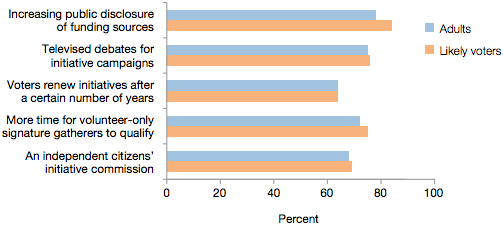PPIC: Initiative Process Needs to Be Reformed

The Public Policy Institute of California published a report on public perceptions and recommendations on the state's initiative process. While a majority of Californians favor the initiative process, many want to see changes made to the process itself.
Currently, 72 percent of Californians believe initiatives are a positive way to change policies. However, less than 10 percent are fully satisfied with how the process works. Concerns range from convoluted ballot language, the perceived role of "special interests" in forming initiatives, the amount of money spent on initiative campaigns, and distrust of the legislature handling of fiscal decisions.
The following five suggestions to reform the initiative process would have majority support:
Support for Proposals to Improve the Process, credit: PPICThe PPIC made three recommendations to improve initiatives:
- "Connect the legislative and initiative processes: Californians like the idea of expanding the legislature’s involvement in the initiative process—as long as voters continue to be part of the decision making. PPIC Surveys show that overwhelming majorities of Californians favor having a period of time that an initiative sponsor and the legislature could meet to seek compromise before a measure goes to the ballot. Overwhelming majorities of Californians also support a system of review and revision for proposed initiatives to try to avoid legal issues and drafting errors."
- "Increase disclosure of initiative funders: Steps to increase public disclosure could include naming the top financial backers in signature-gathering materials, paid advertising, and the voter information guide. Voters could also get a chance to meet the advocates and opponents of an initiative through televised debates between the two sides. Televised debates are supported by overwhelming majorities in the PPIC Survey."
- "Reengage citizens in the initiative process: Californians have lost their connection to their own citizens’ initiative process—one in which it takes a well-funded campaign just to get a measure on the ballot. Strong majorities of Californians like the idea of giving initiative sponsors more time to qualify for the ballot if their campaigns use volunteers rather than paid workers to gather signatures."
"Voters have taken the power to draw legislative districts from the legislature, replaced partisan primaries with the top-two primary, changed legislative term limits, enabled legislators to pass a state budget with a simple majority vote, and raised their own taxes through a citizens’ initiative, Proposition 30. Given this recent history of reform and the consensus for making changes to the initiative process, the state may be poised to improve its system of direct democracy." - Mark Baldassare, President of the PPIC
The initiative process provides voters a chance to make legislative changes in the state. Proposed initiatives must be cleared by the State Attorney General and obtain enough signatures from registered voters to make it onto the general election ballot. It was implemented in 1911 during the governorship of Hiram Johnson. In the past 10 years, there have been 100 ballot initiatives, 68 of which were citizens' initiatives.
Mark Baldasarre summarizes the PPIC report and its findings in a short video:
http://youtu.be/RXYX9cK6sgU



